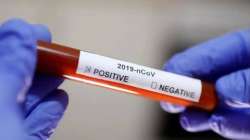ICMR asks states to begin sero-surveys to track 'coronavirus exposure' of asymptomatic patients
The ICMR has asked the state governments to begin the deployment of sero-surveys in order to track the exposure to coronavirus of the recovered, asymptomatic and high-risk patients

The Indian Council of Medical Research (ICMR) has asked the state governments to begin the deployment of sero-surveys in order to track the exposure to coronavirus of the recovered, asymptomatic and high-risk patients. "Sero-surveys help to understand the proportion of population exposed to SARS-CoV2 infection, including asymptomatic individuals," said a release issued by the ICMR on Saturday.
The sero-survey could also be deployed among high-risk or vulnerable populations to know who has been infected in the past and have now recovered, said the release.
The ICMR said that the sero-survey would be conducted using an IgG ELISA kit. "Scientists at ICMR-National Institute of Virology, Pune have developed and validated an indigenous for antibody detection for SARS-CoV2," said the release.
IgG antibodies generally start appearing after two weeks of onset of infection and last for several months, said ICMR, adding that the IgG test is not useful for detecting acute infection, for which the RT-PCR test remained the "gold-standard."
The ICMR said that it was advising the states to roll out sero-surveys to help the authorities chart a future course of action in dealing with the COVID-19 epidemic. The nodal agency tasked with the government's coronavirus health response said that the indigenously developed technology had a high degree of specificity and sensitivity.
To fast-track production and increase availability of the IgG ELISA test, ICMR has transferred the technology to many pharma companies, including Zydus Cadila, J Mitra and Company, Meril Diagnostics and Voxur Bio among others.